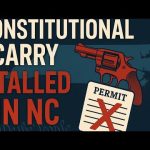A recent significant lawsuit has emerged from Massachusetts, aimed at challenging the state’s stringent gun laws that affect not only residents but also non-residents seeking to exercise their Second Amendment rights. This legal battle could have nationwide implications for how individuals across America access their rights to bear arms. Filed on August 13, 2025, by a coalition of gun owners and key Second Amendment organizations, this lawsuit is poised to confront the bureaucratic red tape that many non-residents face when attempting to obtain licenses to carry firearms in Massachusetts.
At the core of this lawsuit are four Massachusetts officials, including the Attorney General and the Commissioner of Criminal Justice Information Services, who are facing accusations of enforcing an unconstitutional licensing scheme. This scheme, according to the plaintiffs, creates an unjust and lengthy process for non-residents wishing to carry firearms for self-defense. Massachusetts law currently requires non-residents to apply for a temporary license that is only valid for a year, unlike the six-year validity period given to residents. This stark difference in treatment raises serious concerns about equal protection under the law, as highlighted in the lawsuit.
The lawsuit outlines how non-residents are subjected to a convoluted application process, often taking four to six months or longer, far exceeding the state law mandate of a 40-day processing time. With the potential for severe penalties—including felony charges for those carrying firearms with expired licenses—this legal action argues against the unconstitutional nature of Massachusetts’s approach to firearm licensing. The plaintiffs contend that the delays and complications resulting from the state’s processes are not only an infringement on their rights but a blatant suppression of their fundamental privileges as American citizens.
The plaintiffs in this case have compelling stories that underscore the need for reform. They include individuals like Russell Lawson Jr., who faced significant delays in securing his license while owning property in Massachusetts, and Christopher Penta, who was left without a valid license for weeks despite his law-abiding status. These narratives emphasize that the individuals affected are not criminals but responsible citizens attempting to protect themselves and their families. The lawsuit seeks to bring accountability to a system they argue is riddled with inefficiencies and violations of constitutional rights.
Should this lawsuit succeed, it could dismantle the current licensing scheme imposed on non-residents by forcing the Massachusetts government to comply with established legal standards. It could potentially serve as a precedent for other states with similar restrictive measures, making it crucial for gun rights advocates to rally around this cause. The outcome may not only enhance the individual rights of non-residents but also reinforce the significance of the Second Amendment nationally.
The implications of this case are far-reaching, underscoring the importance of challenging restrictive gun laws that threaten the rights of lawful gun owners. This ongoing legal battle reinforces the need for vigilance and persistence in standing up for the Second Amendment. Advocates for gun rights must continue to support legal efforts that aim to protect and expand these freedoms, ensuring that they remain intact for all Americans, regardless of where they live.




